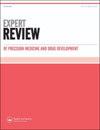Mutation-dependent treatment approaches for patients with complex multiple myeloma
IF 1.2
Q4 PHARMACOLOGY & PHARMACY
Expert Review of Precision Medicine and Drug Development
Pub Date : 2021-02-26
DOI:10.1080/23808993.2021.1893605
引用次数: 0
Abstract
ABSTRACT Introduction: Multiple myeloma is a complex hematologic malignancy that is considered incurable. The increasing comprehension of the genomic complexity has provided new insights into the therapeutic landscape of the disease. Next-generation sequencing studies have identified numerous driver gene mutations and alterations in signaling pathways, implicated in pathobiology and disease progression. Areas covered: Molecular tailored therapies against specific genetic alterations are under development in preclinical studies. These alterations include mutations in BRAF/KRAS/NRAS, FGFR3, overexpression of BCL2, and abberation in pathways such as MYC, JAK/STAT, NFκB, and PI3K/AKT/mTOR. Some of these novel anti-myeloma agents have entered clinical setting, as well. The question of whether these agents should be given as monotherapy or in combination with contemporary regimens is being addressed in ongoing trials. In the current review we present an up-to-date overview of targeted therapies MM. Expert opinion: Although fully personalized MM therapy is nowhere near, new technologies that allow rapid, detailed (and at a feasible cost) evaluation of the genetic content of myeloma on an individual basis may actually allow the development of therapies based on molecular profiling. These regimens may also have the potential to predict prognosis and achieve durable responses when established therapies are unable to overcome drug resistance.复杂多发性骨髓瘤患者的突变依赖治疗方法
摘要简介:多发性骨髓瘤是一种复杂的血液恶性肿瘤,被认为是无法治愈的。对基因组复杂性的日益理解为该疾病的治疗前景提供了新的见解。新一代测序研究已经确定了许多驱动基因突变和信号通路的改变,涉及病理生物学和疾病进展。涉及领域:针对特定基因改变的分子定制疗法正在临床前研究中开发。这些改变包括BRAF/KRAS/NRAS、FGFR3的突变、BCL2的过表达以及MYC、JAK/STAT、NFκB和PI3K/AKT/mTOR等通路的畸变。其中一些新型抗骨髓瘤药物也已进入临床应用。这些药物是否应该作为单一疗法或与当代治疗方案联合使用的问题正在进行的试验中得到解决。在当前的综述中,我们对靶向治疗骨髓瘤进行了最新的概述。专家意见:尽管完全个性化的骨髓瘤治疗还远未实现,但新技术可以在个体基础上快速、详细(并以可行的成本)评估骨髓瘤的遗传含量,这实际上可能使基于分子谱分析的治疗得以发展。当现有的治疗方法无法克服耐药性时,这些方案也可能具有预测预后和实现持久反应的潜力。
本文章由计算机程序翻译,如有差异,请以英文原文为准。
求助全文
约1分钟内获得全文
求助全文
来源期刊

Expert Review of Precision Medicine and Drug Development
PHARMACOLOGY & PHARMACY-
CiteScore
2.30
自引率
0.00%
发文量
9
期刊介绍:
Expert Review of Precision Medicine and Drug Development publishes primarily review articles covering the development and clinical application of medicine to be used in a personalized therapy setting; in addition, the journal also publishes original research and commentary-style articles. In an era where medicine is recognizing that a one-size-fits-all approach is not always appropriate, it has become necessary to identify patients responsive to treatments and treat patient populations using a tailored approach. Areas covered include: Development and application of drugs targeted to specific genotypes and populations, as well as advanced diagnostic technologies and significant biomarkers that aid in this. Clinical trials and case studies within personalized therapy and drug development. Screening, prediction and prevention of disease, prediction of adverse events, treatment monitoring, effects of metabolomics and microbiomics on treatment. Secondary population research, genome-wide association studies, disease–gene association studies, personal genome technologies. Ethical and cost–benefit issues, the impact to healthcare and business infrastructure, and regulatory issues.
 求助内容:
求助内容: 应助结果提醒方式:
应助结果提醒方式:


